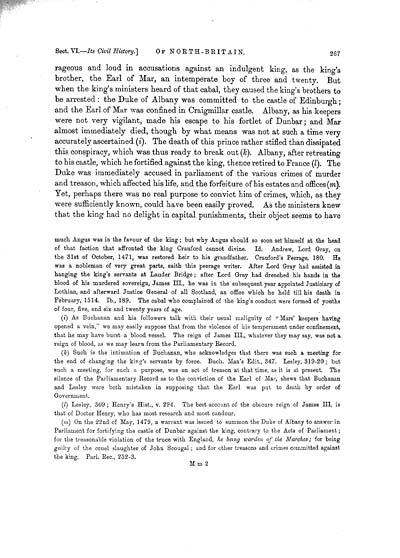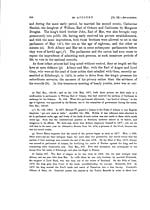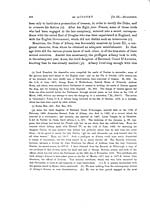Volume 3
(279) Page 267
Download files
Individual page:
Thumbnail gallery: Grid view | List view

267 rageous and loud in accusations against an indulgent king, as the king's brother, the Earl of Mar, an intemperate hoy of three and twenty. But when the king's ministers heard of that cabal, they caused the king's brothers to be arrested : the Duke of Albany was committed to the castle of Edinburgh; and the Earl of Mar was confined in Craigmillar castle. Albany, as his keepers were not very vigilant, made his escape to his fortlet of Dunbar; and Mar almost immediately died, though by what means was not at such a time very accurately ascertained (i). The death of this prince rather stifled than dissipated this conspiracy, which was thus ready to break out (k). Albany, after retreating to his castle, which he fortified against the king, thence retired to France (l). The Duke was immediately accused in parliament of the various crimes of murder and treason, which affected his life, and the forfeiture of his estates and offices (m). Yet, perhaps there was no real purpose to convict him of crimes, which, as they were sufficiently known, could have been easily proved. As the ministers knew that the king had no delight in capital punishments, their object seems to have much Angus was in the favour of the king ; but why Angus should so soon set himself at the head of that faction that affronted the king Crauford cannot divine. Id. Andrew, Lord Gray, on the 31st of October, 1471, was restored heir to his grandfather. Crauford's Peerage, 180. He was a nobleman of very great parts, saith this peerage writer. After Lord Gray had assisted in hanging the king's servants at Lauder Bridge; after Lord Gray had drenched his hands in the blood of his murdered sovereign, James III., he was in the subsequent year appointed Justiciary of Lothian, and afterward Justice General of all Scotland, an office which he held till his death in February, 1514. Ib., 189. The cabal who complained of the king's conduct were formed of youths of four, five, and six and twenty years of age. (i) As Buchanan and his followers talk with their usual malignity of " Mars' keepers having opened a vein," we may easily suppose that from the violence of his temperament under confinement, that he may have burst a blood vessel. The reign of James III., whatever they may say, was not a reign of blood, as we may learn from the Parliamentary Record. (k) Such is the intimation of Buchanan, who acknowledges that there was such a meeting for the end of changing the king's servants by force. Buch. Man's Edit., 347. Lesley, 319-20 ; but such a meeting, for such a purpose, was an act of treason at that time, as it is at present. The silence of the Parliamentary Record as to the conviction of the Earl of Mar, shews that Buchanan and Lesley were both mistaken in supposing that the Earl was put to death by order of Government. (l) Lesley, 309 ; Henry's Hist., v. 294. The best account of the obscure reign of James HI. is that of Doctor Henry, who has most research and most candour. (m) On the 22nd of May, 1479, a warrant was issued to summon the Duke of Albany to answer in Parliament for fortifying the castle of Dunbar against the king, contrary to the Acts of Parliament; for the treasonable violation of the truce with England, he being warden of the Marches; for being guilty of the cruel slaughter of John Scougal; and for other treasons and crimes committed against the king. Parl. Rec., 252-3. Mm 2
Set display mode to:
![]() Universal Viewer |
Universal Viewer | ![]() Mirador |
Large image | Transcription
Mirador |
Large image | Transcription
Images and transcriptions on this page, including medium image downloads, may be used under the Creative Commons Attribution 4.0 International Licence unless otherwise stated. ![]()
| Caledonia, or, An account, historical and topographic of North Britain from the most ancient to the present times > Volume 3 > (279) Page 267 |
|---|
| Permanent URL | https://digital.nls.uk/74528632 |
|---|---|
| Description | Vol. III. |
|---|---|
| Attribution and copyright: |
|

